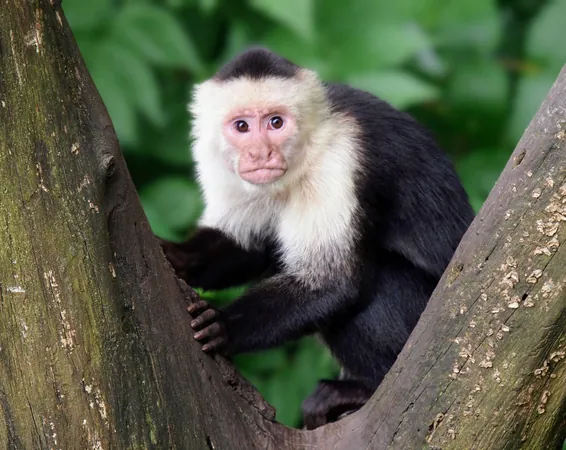
The Surprising Role of Social Tolerance in Capuchin Monkeys' Learning Abilities
2025-01-18
Author: Siti
Deep within Brazil's Caatinga region, fascinating research on capuchin monkeys has revealed astonishing insights into how these primates learn and develop skills through social interaction. A groundbreaking study led by Camila Galheigo Coelho at the University of São Paulo, in collaboration with Professor Eduardo Ottoni and researchers from Durham University, demonstrates that social tolerance plays an essential role in their ability to share knowledge.
Unveiling Social Learning Dynamics
Traditionally, it's understood that primates, including capuchins, learn by observing others. However, this study goes further, suggesting that the social bonds within a group significantly influence how effectively new skills are passed along. Researchers found that monkeys with higher levels of social tolerance—meaning they are more open to interacting with each other—tend to learn better through observation.
Camila Galheigo Coelho explained, “The diffusion of skills is not merely about individuals figuring things out independently. Social tolerance allows monkeys to be close to each other and facilitates the transmission of knowledge and resources.” This discovery underscores the connection between social relationships and knowledge dissemination within primate communities.
The Gritty Details of Learning
The researchers observed that capuchins engaged in social activities such as grooming and play were far more likely to adopt new skills from their peers. Using a mathematical model, they demonstrated that monkeys primarily learn by watching and mimicking experienced individuals rather than through trial and error.
Interestingly, the study emphasized that younger monkeys gravitate towards skilled adult males for learning, suggesting a mentorship-like dynamic that encourages skill acquisition. Professor Ottoni highlighted the significance of their findings: “The diffusion of new techniques occurs through social learning rather than just individual efforts. This has profound implications for our understanding of cultural transmission in animals.”
Cultural Implications and Tool Use
This research forms part of a broader investigation into how social dynamics shape behavior among capuchin monkeys. Professor Ottoni, who has studied these monkeys since the late 90s, noted, “Our initial fluke discovery of tool use spiraled into a revelation of non-human cultural processes.”
Capuchins are known for their dexterity in using tools—cracking nuts with stones, digging for roots, and even hunting small creatures with sticks. These tool-use behaviors differ across populations, indicating culturally distinct practices among groups.
Experimenting with Knowledge Transfer
The researchers set up an experiment with two separate groups of capuchins, each eight kilometers apart. They introduced a novel box with two mechanisms to obtain food: a blue door and a green lever. After training select monkeys in each group on one method, the researchers observed how the rest of the group learned.
Surprisingly, instead of adhering to one method, both groups adapted by mastering both techniques. Coelho stated, “We anticipated that the groups would split into two distinctive learning paths. Instead, both learned to utilize both methods, showcasing their adaptability.”
Impact of Social Structure on Learning
The study also revealed how group dynamics influence learning outcomes. In larger, fragmented groups, over half (57.5%) of the monkeys quickly grasped the task, as knowledge flowed easily between the subgroups. Conversely, among smaller, closely bonded groups, learning was hindered by dominant individuals restricting access and visibility to skilled members, resulting in only 36.7% successfully learning the technique.
This significant finding emphasizes how crucial social tolerance and open interactions are for effective learning and knowledge sharing, reflecting dynamics also seen in human societies.
A Glimpse into Cultural Evolution
Ultimately, this research enriches our understanding of cultural evolution in non-human primates, providing insights into how they cultivate traditions and pass down knowledge through generations. Professor Ottoni concluded, “Our findings reinforce the idea that cultural evolution is intricately linked to biological evolution, highlighting a broader narrative in the understanding of life on Earth.”
The implications of this research stretch far beyond the capuchin monkeys, opening a window into the complexities of social learning and cultural practices across the animal kingdom. The full study can be found in the journal *Proceedings of the National Academy of Sciences*.
Stay tuned for more intriguing insights into the world of animal behavior and social dynamics!

 Brasil (PT)
Brasil (PT)
 Canada (EN)
Canada (EN)
 Chile (ES)
Chile (ES)
 Česko (CS)
Česko (CS)
 대한민국 (KO)
대한민국 (KO)
 España (ES)
España (ES)
 France (FR)
France (FR)
 Hong Kong (EN)
Hong Kong (EN)
 Italia (IT)
Italia (IT)
 日本 (JA)
日本 (JA)
 Magyarország (HU)
Magyarország (HU)
 Norge (NO)
Norge (NO)
 Polska (PL)
Polska (PL)
 Schweiz (DE)
Schweiz (DE)
 Singapore (EN)
Singapore (EN)
 Sverige (SV)
Sverige (SV)
 Suomi (FI)
Suomi (FI)
 Türkiye (TR)
Türkiye (TR)
 الإمارات العربية المتحدة (AR)
الإمارات العربية المتحدة (AR)